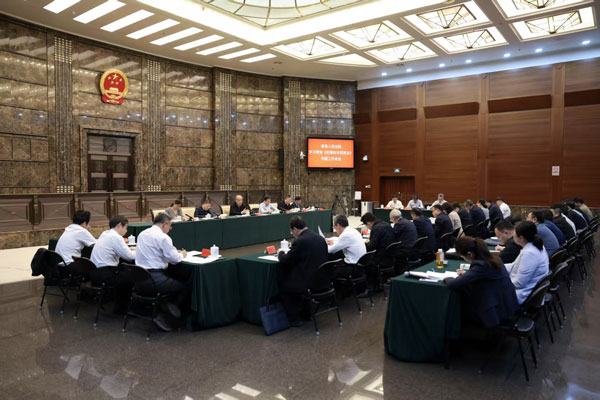SPC vows strong judicial support for enforcement of private sector promotion law
China’s first comprehensive legal framework dedicated to supporting and protecting private economic development, the private sector promotion law, officially came into effect on May 20.
In response, the Supreme People’s Court (SPC) convened a meeting to explore how the judiciary can effectively implement the law through practical measures and support the sustainable growth of the private economy. Zhang Jun, president of the SPC, chaired the meeting.

The Supreme People’s Court (SPC) convenes a meeting to explore how the judiciary can effectively implement the private sector promotion law through practical measures. Zhang Jun, president of the SPC, chaired the meeting. [Photo/court.gov.cn]
During the meeting, heads of relevant departments of the SPC introduced plans to apply the law in case handling. These include showcasing typical cases, organizing expert-led training for judges, and aligning enforcement of the law with the ongoing campaign on regulating enterprise-related judicial practices.
Participants highlighted the law’s emphasis on timely case filing and mediation based on voluntary and lawful principles, vowing to deepen diversified dispute resolution practices rooted in the “Fengqiao Experience”. They also pledged to enhance oversight over the handling of complex criminal-civil hybrid cases to prevent improper interference and ensure independent adjudication.
In light of the growing relevance of e-commerce and emerging industries, the SPC is reviewing representative cases to promote equal protection for both private enterprises and consumers. It is also studying legal issues related to overseas operations to help private entrepreneurs navigate cross-border risks, in line with the law’s call for stronger international legal services, according to the meeting.
Efforts are underway to solicit feedback from grassroots communities through circuit court visits, aiming to improve judicial policies responsive to private sector concerns, the participants noted. In addition, the SPC reported progress in refining enforcement practices, with a 7.59-percent drop in newly listed defaulters in the first four months—an indicator of improved credit protection for businesses.
Zhang underscored that legal protection must go beyond formal equality to address the real complexities of modern business. In addition to fair adjudication, courts should focus on resolving disputes at an early stage, especially as new types of cases emerge in the evolving economy. Effective practices used to handle these cases should be instrumental in the development of legal norms and contribute to broader national governance, Zhang added.
The meeting emphasized the political, legal, and developmental significance of the private sector promotion law as a crucial step in implementing the directives of the Central Committee of the Communist Party of China. Participants were encouraged to deepen their understanding of current legal and economic principles and to ensure that courts uphold impartial and rigorous justice to support the vitality of the private sector.
To guarantee effective law enforcement, the SPC called on courts to translate legal principles into concrete actions. This includes refining judgment rules, ensuring consistency in legal application, and advancing initiatives like the ongoing effort to regulate enterprise-related judicial practices. These efforts aim to build a fair, transparent, and law-based business environment.
The meeting called for strengthening institutional safeguards to support private businesses. Courts were encouraged to improve coordination among existing mechanisms, smooth feedback channels for enterprises, and expand legal education through exemplary cases.
Deng Xiuming, executive vice-president of the SPC, as well as other vice-presidents Mao Zhonghua, Shen Liang and Gao Xiaoli, and Liu Guixiang, a standing member of the SPC’s Adjudication Committee , attended the meeting, along with representatives from relevant departments of the SPC.







